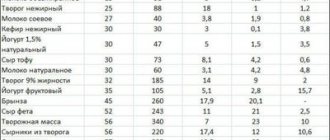Should I stop drinking coffee while breastfeeding?
According to scientific data, it takes about ten hours to remove caffeine from the body of an adult.
On average, one cup contains about 100 - 150 mg, and its maximum content in breast milk is reached after one hour. Can nursing mothers drink coffee, or should they not drink it during lactation? This question interests many mothers, especially “ardent” lovers of this drink.
General information about the effects of coffee on the body
This drink has a tonic, stimulating, invigorating effect, as well as improving brain activity and enhancing the digestive process.
It contains: caffeine, trigonelline, chlorogenic acid, vitamin P, essential oils, tannins.
This drink, like all food products, is absorbed into the blood and passes through breast milk to the baby. Therefore, if it is used excessively or if there are contraindications, side effects may occur.
It poses a particular threat in cases of prematurity and a tendency to allergic reactions.
The most common complications when using it during lactation are considered to be: an allergic reaction, sleep disturbance, overexcitation, capriciousness and tearfulness of the child, colic, anemia and dehydration in the baby.
Penetration of coffee into breast milk
When a nursing woman consumes it, the caffeine contained in it penetrates into the milk quite well, but is difficult to remove from the baby’s body. Therefore, if a mother drinks this drink regularly and in large quantities, caffeine accumulates in the baby’s body. In turn, this will negatively affect the well-being and condition of the child.
Different types of coffee have different caffeine content, and newborns and children under two years old cannot quickly eliminate it from the body. Therefore, this drink may contribute to side effects.
Average rates of caffeine excretion in children, depending on the age of the baby.
| Age | Number of hours |
| Premature | 66 – 105 |
| 0 – 3 months | 80 – 98 |
| 3 – 6 months | 14 — 15 |
| 6 months to 2 years | 2,5 – 10 |
Negative effects of caffeine on a baby while breastfeeding
The effects of this drink are varied. It affects many organs and systems. For example, it acts on the baby’s body in the following way:
- promotes overexcitation, tearfulness and irritability;
- causes allergic reactions;
- has a diuretic effect;
- removes calcium and other minerals;
- consuming it in large quantities helps to reduce the concentration of iron in breast milk and leads to the development of anemia in the baby.
It is necessary to immediately stop taking this drink if caffeine or drugs that have a similar effect (for example, theophylline, etc.) are prescribed.
Misconceptions about drinking coffee while breastfeeding
There are many misconceptions about its use during lactation. And here are some of them.
- When choosing drinks, preference should be given to green tea. This opinion is considered erroneous because it also contains caffeine (theine), which irritates and excites the nervous system.
- It is recommended to replace this drink with decaffeinated coffee. But the mistake is that it also contains it, but just in smaller quantities. The disadvantage of this type of coffee is its high cholesterol content, which can negatively affect the baby.
- During breastfeeding, the mother should eat and drink everything that she consumed before pregnancy and childbirth, and then her baby will quickly adapt to food. This is not true, since all products are an excessive burden on the baby’s still unformed digestive system. Therefore, it is recommended to introduce adult food into his diet only from six months.
- Many mothers believe that drinking a couple of cups of this drink daily will not affect the condition of the baby in any way. But you should know that if there are contraindications, a tendency to allergies, not only adverse reactions may occur, but also addiction to it.
How to choose the right one
The criteria for choosing a product are its quality, taste, aroma.
When purchasing coffee varieties, focus on the characteristics:
- naturalness of grains;
- manufacturer of products, the best varieties are branded.
To the question is it possible to use instant coffee while breastfeeding, there is only one answer - it is not possible. For the production of secondary products, inferior grades are used; during processing, they contain impurities and chemical components, which is dangerous for a newborn baby.
Advice from consultants. Drink only coffee brewed from beans. Beware of any surrogates in the form of powders or granules. The use of low-quality products contributes to the fact that harmful substances involved in industrial processing penetrate into the baby’s body, causing allergies.
If you really want... Which drink should you prefer?
In the absence of contraindications, drinking coffee in a reasonable amount is not prohibited. However, if the mother is accustomed to it or has developed a dependence on it, it can be replaced with: chicory, herbal infusions, anise, cumin, barley drink, herbal teas, dill water, etc.
If you really want coffee, it is better to follow the following rules:
- use it in the morning so as not to once again provoke restless sleep in the baby;
- It is better to drink it after you have fed the baby, so the nursing woman’s body will have two hours more time to remove caffeine before feeding the baby;
- do not drink coffee daily so that its concentration in milk decreases;
- consume more dairy products;
- it is necessary to increase the general drinking regime, since this drink increases the removal of fluid from the body;
- dilute it with milk.
It is not recommended to consume this drink until at least three months of age.
How to choose coffee?
During breastfeeding, preference should be given to freshly ground beans that have a coarse grind (as they contain less caffeine).
If you grind the beans and brew the coffee before consuming it, the caffeine content in it will be several times less than in what was ground industrially.
It is better not to drink instant coffee, since mostly low grades are used for this type of drink. There is also a chance that you can buy freeze-dried powder with artificial caffeine instead (which contains twice as much caffeine as coffee beans).
How to cook?
Before brewing this drink, you need to grind just enough grains to be enough for one time.
You need to pour clean spring water or filtered water into the Turk (up to its neck), then add two teaspoons of ground grains (per serving), and, if desired, one or two spoons of granulated sugar. The drink must be brewed over low heat. When the foam begins to rise, you should set the Turk aside so that it settles a little. This procedure must be repeated three times. After this, the drink can be poured into cups.
Frequency of coffee consumption by women during lactation
It is prohibited to drink more than 3 to 4 cups of this drink during lactation, as side effects may occur.
If the mother is a coffee lover and cannot give it up during breastfeeding (given that there are no other contraindications), then it is permissible to drink a couple of cups a day.
But it is very important to monitor the baby’s reaction, and it is also necessary to exclude all other products containing caffeine.
Coffee with milk
Can a nursing mother have coffee with milk and is it healthier?
In the absence of an allergic reaction to coffee and if it is tolerated, it is better to drink this drink with milk. Since it contains a lot of calcium, and it is necessary for the baby’s bones to be healthy and strong. In addition to calcium, milk contains zinc, which has a beneficial effect on the baby’s skin, nails and hair.
Until the age of six months, the mother should not drink more than 50 ml of milk per day, since in addition to allergic reactions, the baby may also experience intestinal problems (increased gas production, abdominal pain, bowel dysfunction). After the child reaches this period, you can gradually increase the volume of milk to 200 ml.
Milk should be natural, not ultra-pasteurized. Its fat content should be from 2.5%. It is permitted to consume this product in store-bought bags or packaging.
Komarovsky's opinion
What does Dr. Komarovsky say about whether you can drink coffee while breastfeeding? Mothers follow his advice on feeding their children.
He developed criteria for the inadmissibility of drinking coffee by nursing mothers:
- if a rash appears from “coffee” milk, immediately eliminate the drink from your diet;
- Have you noticed that after drinking a drink and feeding your baby, he becomes restless and his sleep is disturbed;
- prohibition for medical reasons when a child is treated with drugs containing caffeine, for example, theophylline for lung diseases.
If the listed factors are absent, mothers with breastfeeding are allowed to drink coffee, says the famous pediatrician Komarovsky.
Now you know why you need to limit your drink consumption, whether you can drink more than two cups of coffee while breastfeeding, and from how many months it is permissible to introduce coffee drinking into your diet. Follow the recommendations and indulge yourself, but do not overuse the drink to keep your baby healthy.
Looking for an alternative to coffee
If a mother or child has contraindications to its use, it is recommended to exclude coffee from your diet (at least temporarily).
But what to do if mom loves him very much or one or two cups a day is not enough for her? In this case, you can find an alternative to coffee.
Substitutes for this drink are:
- chicory. It contains many vitamins, macro- and microelements, as well as many other useful components. This drink has a calming effect on the nervous system, gastrointestinal tract, improves metabolic processes in the body;
- barley drink. One of its important advantages is increased lactation. It contains proteins, vitamins, plant fiber, and mineral salts. Barley drink improves the functioning of the kidneys and digestive system;
- acorn coffee. This drink contains a lot of protein, tannic acids, starch substances, and plant flavonoids. Thanks to which it has an anti-inflammatory, antibacterial effect, and acorn coffee normalizes the functioning of the cardiovascular, nervous, respiratory and digestive systems.
Pediatrician's opinion on coffee during breastfeeding
In reasonable quantities, its use does not pose a particular threat to the health of the mother and baby.
But if there are contraindications, it should not be used (for example, the child was born premature, there are manifestations of an allergic reaction, etc.), as adverse reactions may occur. It is recommended not to drink this drink until the baby is three months old, since the rate of caffeine elimination from the body during this period is very low. But still, if a mother cannot completely give up coffee, she should not abuse it. If the “craving” is very high, then it is better to replace it with alternative drinks.
Reviews of nursing mothers who drank cappuccino
Real reviews from women found on forums dedicated to mothers and children.
Alesya, 19 years old
My baby is two months old. Once a week I can afford to drink cappuccino coffee.
Olga, 25 years old
I worked as a barista for several years.
There is another way out - DECAFEINE coffee. You come to a tea shop where they sell coffee tea by weight, and ask if there is... The taste is almost indistinguishable from regular coffee. Only it is harmless, it is also called “childish”. I constantly ground and cooked this for my kids.
And coffee is my passion, I don’t know how I would live without latte and cappuccino.
Dana, 29 years old
I generally have low blood pressure all my life. And the doctors prescribed coffee for me every morning, otherwise I’ll faint)))) I drink it, but 50/50 with milk))))











